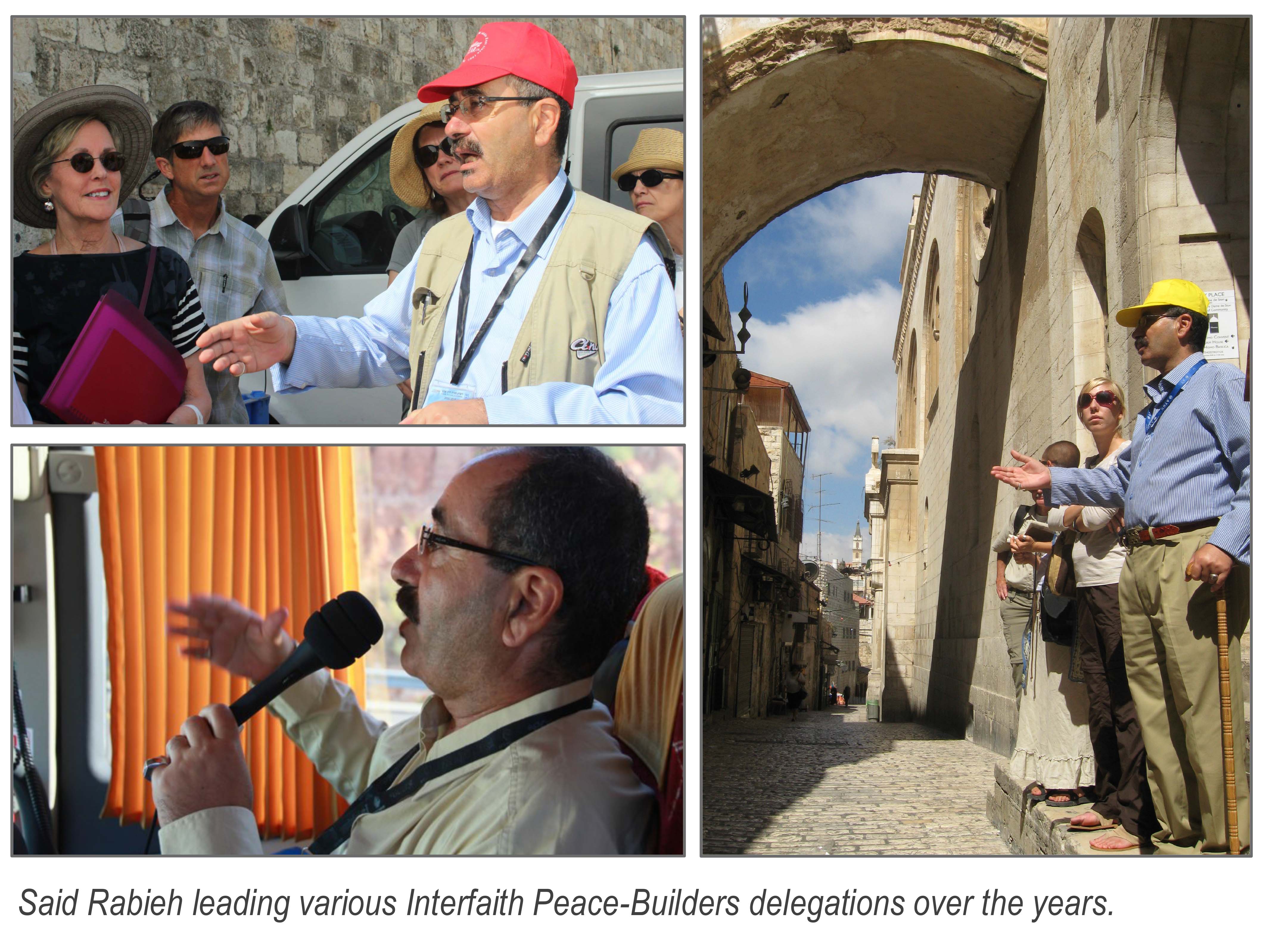standard tours seek salvation for themselves,
INTERFAITH PEACE-BUILDERS SEEKS SALVATION FOR THE OTHER
An interview with guide Said Rabieh
Said Rabieh has been guiding Interfaith Peace-Builders delegations since 2006. In that time, he has exposed more than 700 IFPB delegates to the intricacies of the Holy Land. Said’s love and deep knowledge of the land knows few boundaries. IFPB’s Jacob Pace sat down with Said one evening during our most recent delegation to ask him about his experiences with IFPB delegations and his hopes for peace with justice in his homeland. The interview is featured in IFPB's Autumn 2015 newsletter, available for download here.
Jacob Pace: Ustaaz Said, thank you so much for leading so many IFPB delegations. We really think of you as an important part of the work that IFPB does; we see you as one of us.
Said Rabieh: A member of the family.
JP: Yes, a member of the family. You have made an impact on hundreds of people who have joined IFPB delegations. The first IFPB delegation you led was in March of 2006. Before you began that first trip did you know that it was going to be a different kind of group that you were leading?
SR: I believe that first delegation was when IFPB was still under the auspices of the Fellowship of Reconciliation (FOR). When I was assigned to that group I didn't know that I would have more IFPB delegations in the future. After that delegation, it seems I started to be requested - maybe by the FOR - for the upcoming delegations. Between 2006 and today I have not missed any delegations.
JP: You are very experienced and well-respected guide. When we walk with you in Jerusalem the other guides all greet you. You could fill your schedule with much larger delegations of Christian pilgrims, yet even when the IFPB delegations are smaller, you continue to lead them.
SR: First of all, these IFPB groups give me a break from leading continuously, all year long, Christian pilgrimage groups. On the IFPB trips, I am able to talk about other things, not just the Bible. IFPB delegates want to hear about the society and about the human beings that are living here. You know, I feel that the people who come with Interfaith Peace-Builders are interested in the living stones rather than simply the dead stones that the pilgrimage tours come to see. So I enjoy the IFPB delegations. I enjoy the opportunity to speak freely and to share what life is like here.
JP: It seems to me that is not just a break that you like but that you are very committed to helping individual delegates understand the situation here.
SR: Actually, you are right. I do admire the people who choose to join an IFPB delegation. I said to the last group that the standard tourists seek salvation for themselves, but IFPB delegates seek salvation for others. This is the difference between IFPB delegates and many of those who come on the pilgrimage tours. When IFPB delegates travel overseas, they are aware of the others&rsquo passion and suffering. In my opinion this is how one earns the right to be called “noble”. A noble person is aware of others’, of their suffering, of their struggles, and of the complexity of their lives. So I believe that those who travel with IFPB are very noble people.
JP: I have traveled with you on four delegations and it's clear to me that you also care deeply about those “living stones” about the people here in Palestine.
SR: Of course. Since 2000, I have been an elected member of the Board of the Arab Tour Guides Union. I am aware of my society, and of my people, and I can express this to IFBB delegations. This is important. You know, often people here tell me, “You have been bringing these foreigners here for a long time, but what have they done? How has our life changed in the years that they have been coming?” But I am sure - I am very sure - that even though it is a slow process, one day the fruits will be ripened. The Israelis waited 2000 years to establish their state. We Palestinians still have time. Our struggle is new. So let us take our time.
JP: I think that is a beautiful sentiment and it is not uncommon. The Palestinians call it sumoud or steadfastness.
SR: Yes, I feel this. I don't only feel it. I see it on the ground! The number of Palestinians in the West Bank and Gaza is multiplying, not decreasing. So we are determined to stay.

JP: So what does the future hold for Palestine and for Israel?
SR: I am a tour guide and not a Prophet. But I can see that the Palestinian issue has become international. It will be the headache of the whole world until it is solved. One day, I know it will be solved. I don't know how; but it will be.
JP: If you could have every IFBB delegate take back one thing from the trip, what would it be?
SR: Just to tell what they saw. That's it. What they saw. What they felt. This is enough. To be witnesses. I encourage such a unique form of tourism as that which IFPB is doing. It is really unique because it takes paths which are very different from the other well-worn tourism trails in the Holy Land. There is a kind of humanity, and even perhaps a religious reward, from this type of journey. According to Matthew 5 “Blessed are the peacemakers” and the people on these delegations are peace-builders, so it is good for us to continue to do this work.
Please give generously. It is greatly needed and very much appreciated.
This interview is featured in IFPB's Autumn 2015 newsletter, available for download here



.jpg)